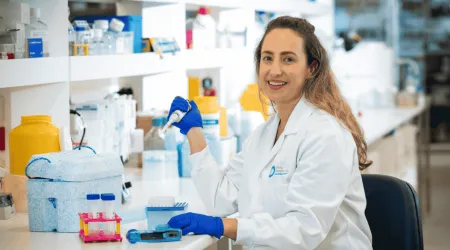
Newly diagnosed with colorectal cancer? Start here.
If you or a loved one has just been diagnosed with colorectal cancer, it's important to find out as much as you can about the disease. Visit our newly diagnosed page to find helpful information and resources to put you on the path to survivorship.
Treatment resources for people impacted by colorectal cancer
No matter how you've been impacted by colorectal cancer, we're here for you with information and support about treatment.

For patients
Colorectal cancer is highly treatable, but going through treatment can be tough. Knowing what to expect can help. We've put together helpful information and resources about your treatment options.

For survivors
Now that you've defeated colorectal cancer, what comes next? Get information and resources about being a colorectal cancer survivor, from monitoring for recurrence to staying cancer-free.

For caregivers
When a loved one is diagnosed with cancer, you’re shoved into a world of medical appointments and barely understandable cancer jargon. We've assembled a collection of caregiver resources to help.
Types of colorectal cancer treatments
There are several treatment options for colorectal cancer. We're here to help you learn more about each treatment option and what to expect.
Surgery
Surgery for colorectal cancer is when a surgeon removes the diseased portion of your colon and/or rectum.
Colostomy and ileostomy
A colostomy is created when a portion of the colon or the rectum is removed and the remaining colon is brought to the abdominal wall.
Chemo, radiation, and other therapies
Colorectal cancer can also be treated using systemic therapies like chemo and radiation that reach cancer cells throughout the body.
Find a clinical trial
Clinical trials are an important treatment option to consider. Answer a simple series of questions about your medical condition to find relevant trials that may fit your needs.

Why biomarkers matter
Understanding your biomarkers helps you and your doctor decide on the most effective treatment plan for your colon cancer. During biomarker testing, doctors collect a sample of your tumor or your blood to look for unique characteristics, such as whether your cancer is caused by an inherited mutation.

Your emotional health during treatment
Colon cancer treatment can be challenging for both the body and the mind. Many patients describe difficult emotions such as loneliness, anger, guilt, sadness, and worry, in addition to feeling overwhelmed with uncertainty about their health and other areas of their life.
Kelly Kranson: Lessons learned through treatment

October 22, 2022
Kelly Kranson was 39 years old when she was diagnosed with colorectal cancer that had spread to her ovaries. A mom to three young children, Kelly faced tremendous physical and mental challenges – and learned a lot of lessons about facing colon cancer treatment, which she shares in this blog.
Get help and support
When you're undergoing treatment for colorectal cancer, it can be helpful to seek support. Resources, information, and allies to talk to are always available.
Sign up for BlueHQ
BlueHQ is a free, comprehensive support hub that delivers personalized resources, tools, and communities to better navigate colorectal cancer.
Contact our live Helpline
The Alliance's certified patient and family support navigation team is here to assist colorectal cancer patients, survivors, and caregivers.
Join our online communities
No one should experience colorectal cancer alone. Our national network of survivors and advocates is standing ready to be your ally.
Buddy program
A vetted Buddy who has been through a similar diagnosis can share meaningful and useful advice that helped them get through colorectal cancer.
Visit the resource library
Our trusted resource library offers articles, videos, guides, and other information to help you and your loved ones navigate colorectal cancer.
Living well with cancer
Stories of hopeTop resources

Where breakthroughs begin: Project Cure CRC spotlight on Dr. Lisa Mielke
hrough Project Cure CRC, the Alliance is fueling bold, early-stage research with the potential to transform colorectal cancer treatment. Dr. Lisa Mielke’s groundbreaking work explores how the gut’s immune system and nerve signaling influence cancer growth—opening the door to new therapeutic approaches, including repurposed existing drugs. This is what’s possible when promising ideas get the support they need to move forward.

Bringing biomarker testing within reach: CLEAR for CRC to empower patients from day one
Biomarker testing can guide colorectal cancer treatment and improve outcomes. Learn how CLEAR for CRC is helping patients access this critical tool.

John E.: Biomarker testing uncovered a pivotal treatment option
After a grim prognosis, biomarker testing revealed a targeted treatment option for John E. Learn how knowing your biomarkers can change what’s possible.







